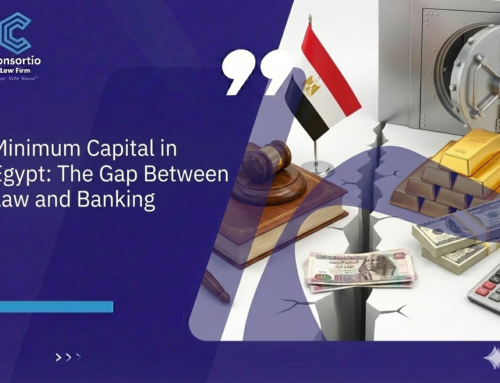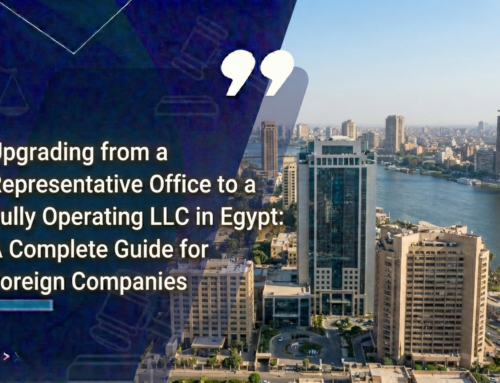Starting a business in Egypt is not just a legal procedure; it is a strategic maneuver.
For foreign investors and multinational corporations, the challenge is not simply “registering” a company—it is ensuring that the legal vehicle chosen today does not become a liability tomorrow. The gap between the written law (72-hour Incorporation) and the administrative reality (security clearances, bank KYC) requires a sophisticated approach.
This guide moves beyond the basics to provide a “Execution Reality” Blueprint for entering the Egyptian market. We break down the timeline not by “steps,” but by critical decision gates.
Phase 1: The Strategic Foundation
Before a single document is filed, three decisions must be made to define your liability and operational scope.
1.1. Selecting the Legal Vehicle
The choice of legal structure dictates your tax exposure, management control, and profit repatriation mechanisms.
| Feature | Limited Liability Company (LLC) | Joint Stock Company (JSC) | One-Person Company |
| Best For | 90% of Foreign Investors (SMEs, Subsidiaries) | Large Capital Projects & IPO Candidates | Solo Founders needing liability protection |
| Liability | Limited to share capital | Limited to share capital | Limited to share capital |
| Min. Capital | No theoretical minimum (Rec: 50k EGP) | 250,000 EGP (10% paid upfront) | 1,000 EGP |
| Management | Manager (Foreigner allowed) | Board of Directors (Min. 3 members) | Single Owner / Manager |
| Complexity | Low: Streamlined governance. | High: Subject to FRA oversight. | Medium: Strict operational rules. |
Strategic Insight: Undecided between an LLC and a Branch? Read our detailed comparison: [LLC vs. Branch Office: The Foreign Investor’s Choice].
1.2. Defining the Corporate Purpose
Your “Object Clause” is more than a description; it is a regulatory trigger.
-
Capital Impact: Certain activities (e.g., Import/Export) trigger higher minimum capital requirements (5 Million EGP).
-
Licensing: Activities like “Training” or “Tourism” require pre-approval from specific ministries before Incorporation.
1.3. The “Name” Defense
To avoid rejection at the registry:
-
The Rule: You must submit 3 distinct name options to the Commercial Registry.
-
The Timer: The “Certificate of Non-Confusion” is valid for only 15 days. If you do not incorporate within this window, the name is released.
1.4. Capital Structure
You must define the Total Capital, Number of Shares, and Share Value.
-
Consortio Warning: While the law allows “zero capital” for LLCs, we strongly advise a minimum of 50,000 EGP. Banks often refuse to open accounts for companies with negligible capital.
Phase 2: Pre-incorporation Prerequisites
These are the “Hidden Steps” that often delay the process if not prepared in advance.
2.1. The Physical Premise (The Lease)
You cannot incorporate a company in Egypt without a physical address.
-
The Requirement: A lease agreement notarized with a “Proof of Date” (Ethbat Tarikh) at the Registry Office.
-
The Solution: Virtual offices are legally acceptable for Incorporation, provided the lease meets specific notarization standards.
2.2. The Auditor Mandate
Every Egyptian entity must appoint an auditor registered with the Accountants & Auditors Register.
-
Required Documents: An official “Acceptance of Appointment” letter and the Auditor’s GAFI registration certificate.
2.3. Security Clearance (The Foreigner’s Hurdle)
This is the most critical “Execution Reality” check.
-
The Rule: Foreign shareholders and managers from specific jurisdictions must undergo a security check.
-
The Timeline: While GAFI may incorporate the company immediately, the clearance runs in the background. A negative result months later can freeze operations.
-
Strategy: Start this process 4 weeks before your planned launch.
2.4. Legalization of Foreign Documents
If the shareholder is a foreign company, your documents (Certificate of Inc., Power of Attorney) must go through the “Chain of Authentication”:
-
Notarization in country of origin.
-
Legalization by the Egyptian Consulate abroad.
-
Authentication by the Egyptian Ministry of Foreign Affairs (MOFA) in Cairo.
Phase 3: The Official Incorporation Process
Once the foundation is set, the filing process is executed.
Step 1: The Power of Attorney (POA)
To allow Consortio to act on your behalf, a POA must be issued.
-
Crucial Detail: The POA must be free of any handwriting or corrections. One typo can cause rejection at the Notary Public.
Step 2: Bank Certificate (For JSCs Only)
-
LLC: No bank deposit required before Incorporation.
-
JSC: You must deposit 10% of the capital and obtain a “Bank Certificate” to file with GAFI.
Step 3: GAFI Filing & Issuance
-
Submission: Your legal representative submits the full dossier to the General Authority for Investment (GAFI).
-
Review: GAFI legal researchers verify the statutes against the Companies Law No. 159 of 1981 or Investment Law No. 72 of 2017.
-
Issuance: The Commercial Register and Tax Card number are issued. Your company now legally exists.
Phase 4: Post-incorporation Compliance
Registration is not Operation. The following steps are mandatory to avoid penalties.
4.1. The “Bank Account” Bottleneck
While the company exists, it cannot transact until a corporate bank account is live.
-
The Reality: This takes 2–4 weeks due to strict Central Bank compliance.
-
The Fix: Ensure your “Ultimate Beneficial Owner” (UBO) documentation is ready on Day 1.
4.2. Tax & Insurance Registration
Within 30 days of Incorporation, you must:
-
Register for Value Added Tax (VAT) if applicable.
-
Open a Employment Law File for the company and the Manager.
-
Register for E-Invoicing: Manual invoices are no longer recognized by the Tax Authority.
Start Your Market Entry Correctly
Incorporating in Egypt is a structured process that rewards preparation and penalizes shortcuts. By understanding the “Execution Reality”—from security clearances to banking compliance—you ensure your business is built on bedrock, not sand.
Ready to execute your market entry?
Do not rely on templates. Secure your capital with a firm that understands the ground reality.
Contact Consortio Law Firm:
📧 Email: Info@consortiolawfirm.com
📱 WhatsApp/Phone: +20 102 880 6061





